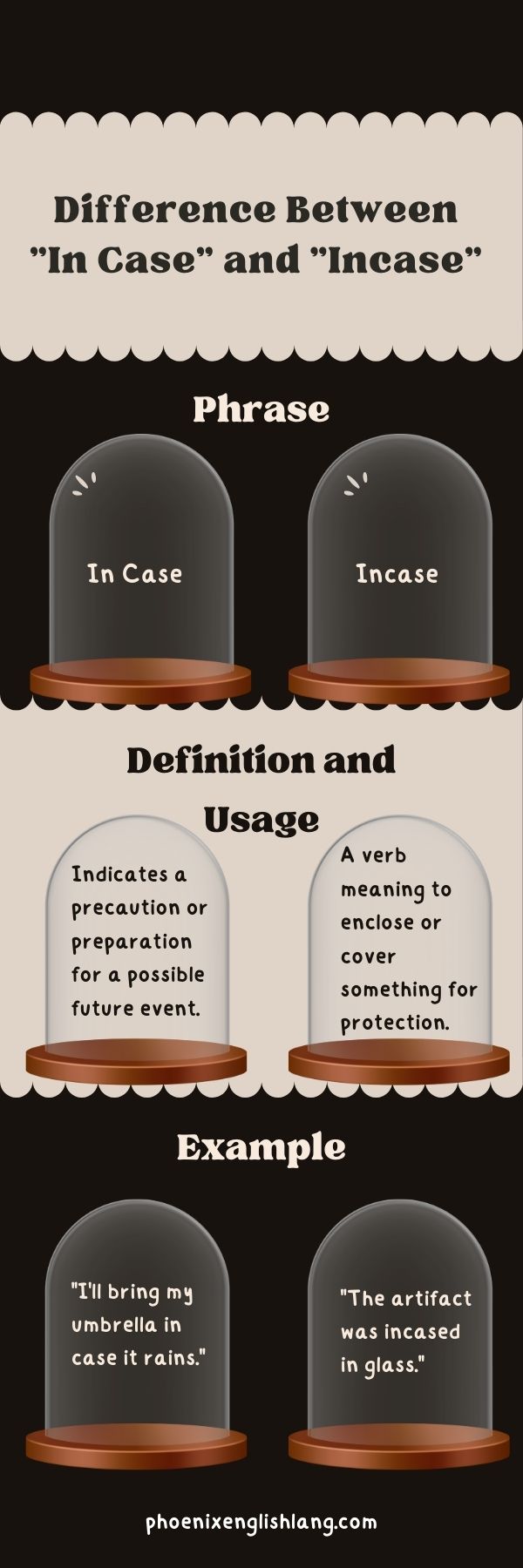When I first encountered the terms “incase” and “in case,” I found myself pondering the correct usage of these phrases.
It’s a common conundrum, given how similar they look and sound. But I believe incase is correct. ️
You might also enjoy: Cancelled or Canceled; Spelling; Examples [2025]
Difference Between “In Case” and “Incase”

Usage of “In Case”
Firstly, “in case” is a frequently used phrase in English that serves a specific function. It is used to indicate a precaution or preparation for a possible future event.
For example, in the sentence, “I’ll bring my umbrella in case it rains,” “in case” introduces the condition (rain) for which the speaker is preparing.
This phrase helps in conveying foresight and readiness for potential situations that might arise. The correct usage of “in case” ensures that the listener or reader understands that an action is being taken as a preventive measure.
Usage of “Incase”
On the other hand, “incase” as a single word is often incorrect in most contexts where “in case” would be proper.
The word “incase” is a verb that means to enclose or cover something, often for protection. For instance, “The artifact was incased in glass” correctly uses “incase” in its verb form, meaning the artifact was surrounded by glass.
However, this usage is quite specific and does not overlap with the conditional or preparatory meaning conveyed by “in case.”
Importance of Proper Usage

Understanding these nuances is essential to avoid misinterpretation. Misusing “incase” in place of “in case” can lead to confusion.
For instance, writing “I’ll bring my umbrella incase it rains” is incorrect and would be perplexing to the reader.
The proper form is “I’ll bring my umbrella in case it rains,” clearly indicating that bringing the umbrella is a precautionary action against the possibility of rain.
Contextual Examples
To further cement this understanding, I examined various contexts and examples. In written English, especially in formal writing or professional communication, the correct usage of “in case” is vital.
It guarantees that the desired message is understood clearly and concisely. For example, “Take some extra cash in case the card machine isn’t working” effectively communicates a precautionary step. Conversely, using “incase” incorrectly here would disrupt the flow and clarity of the message.
Importance in Spoken English
In spoken English, the distinction is equally important. When speaking, clear articulation of “in case” helps the listener understand the conditional nature of the statement. Mispronouncing or incorrectly using “incase” could lead to misunderstandings.
All in all
Recognizing the differences between “in case” and “incase” is crucial for precise communication. “In case” should be used for indicating preventive measures or conditional scenarios, while “incase” is a verb meaning to enclose.
This understanding helps maintain clarity and avoid misinterpretations in both written and spoken English. By mastering the correct usage of these terms, we can ensure our communication is effective and accurate.
Understanding the Basics
To begin, it’s important to understand that “in case” is a frequent English phrase used to refer to a preventive measure or a scenario.
This phrase typically functions to introduce a condition or an action taken to prepare for a possible event. For example, “Take an umbrella in case it rains” means that one should carry an umbrella to be prepared for the possibility of rain.
“In case” helps to convey foresight and readiness for potential situations that might arise.
You might also enjoy: Paid Vs Payed : Differences + Examples [My 2024 Teaching Way]
Differentiating “In Case” and “Incase”

In contrast, “incase” as a single word is often inappropriate in most situations where “in case” would be proper. The single word “incase” is actually a misspelling or an incorrect usage in many contexts.
It is rarely correct in standard English. When “incase” is used, it generally appears in the context of the verb “to encase,” meaning to cover or surround something, often for protection.
For example, “The artifact was incased in glass” correctly uses the verb form, meaning the artifact was enclosed in a glass case. However, this usage is quite specialized and not related to the conditional or preparatory meaning conveyed by “in case.”
You might also enjoy: Due To Or Do To? Grammar + Examples [2024]
Importance of Proper Usage
Understanding the distinction between “in case” and “incase” is crucial for proper communication. Misusing “incase” in place of “in case” can lead to confusion and unclear communication.
It is important to use “in case” when referring to preventive actions or conditional scenarios to ensure the intended meaning is accurately conveyed.
For example, saying “Call me in case you need help” clearly suggests that the listener should call if they find themselves in need of assistance, while “Call me incase you need help” would be incorrect and confusing. In summary, “in case” is a phrase indicating preparedness or conditional action, while “incase” is rarely appropriate and often a misspelling, except when used correctly as a verb meaning to enclose.
Breaking Down “In Case”
“In case” is a two-word phrase that functions as a conjunction. It’s used to indicate that one should do something in preparation for a possible event. For example:
- I always carry an umbrella in case it rains. ☔️
- You should bring a map in case you get lost. ️
- She saved the document on a USB drive in case her computer crashes.
In each of these phrases, the phrase “in case” establishes a situation in which an action is made to prepare for a possible future event. This usage is based on the structure of English grammar, where “in case” functions similarly to “if” or “should” in indicating hypothetical situations.
The Misuse of “Incase”
On the flip side, “incase” is often mistakenly used in place of “in case.” However, “incase” as a single word is a verb that means to enclose or cover something.
This usage is much less common and is usually found in more technical or specific contexts. For example:
- They will incase the monument in glass to protect it.
- The construction workers will incase the wires in protective tubing.
Here, “incase” is correctly used as a verb meaning to enclose. It’s crucial to distinguish this specific verb form from the much more common phrase “in case.”
Historical Usage and Evolution ️
The evolution of language frequently results in confusion between similar-looking phrases, and “in case” versus “incase” is a prime example. “In case” has long been used to indicate caution and preparedness, reflecting its role in everyday communication to express conditional scenarios and preventive actions.
Origins and Development
The phrase “in case” has been part of the English language for centuries, originating from Middle English and evolving through usage.
It combines “in” and “case,” with “case” deriving from the Latin “casus,” meaning an event or occurrence. Historically, “in case” has been utilized in literature, legal documents, and common speech to introduce hypothetical situations or conditions under which certain actions should be taken.
For example, in historical texts, one might find phrases like, “Bring provisions in case we encounter bad weather,” emphasizing the need for readiness.
You might also enjoy: Couch Or Coach: Differences + Usage + Examples [2024]
Complexity of English ️
English, being a language that borrows extensively from others and evolves continuously, has accumulated many terms that look and sound similar yet have different meanings or usages. This borrowing and evolving process has contributed to the complexities of English, where words like “in case” and “incase” coexist but serve entirely different functions.
Usage of “Incase”
“Incase,” as a single word, is much less common and serves a different grammatical role. It is derived from the verb “encase,” meaning to enclose or cover something, typically for protection. This term has specific applications, often found in contexts related to physical protection or containment. For instance, “The jewelry was incased in a velvet-lined box” accurately uses “incase” to describe the action of enclosing the jewelry.
Modern Confusion and Technology
The infrequent use of “incase” compared to “in case” can lead to misunderstandings, particularly in written English, where spellcheck might not always catch such errors. In modern usage, technology like autocorrect and grammar-checking software can sometimes mistakenly suggest “incase” when “in case” is intended, adding to the confusion.
Influence of Other Languages
Furthermore, the influence of other languages and the evolution of English contribute to the dynamic nature of its vocabulary. Words and phrases are continually adopted, adapted, and sometimes misunderstood, leading to variations in usage. As English speakers encounter similar-sounding terms, the importance of context and proper usage becomes paramount to maintaining clarity and precision in communication.
All in all, the historical usage and evolution of “in case” and “incase” reflect the broader dynamics of the English language. “In case” remains a critical phrase for expressing precaution and conditionality, while “incase” is a specific term used for enclosures. Understanding these distinctions helps prevent misinterpretation and ensures effective communication.
Practical Guidelines for Correct Usage

To avoid confusion, it’s helpful to follow some practical guidelines:
- If you mean to prepare for a possible event, use “in case.”
- Example: I’ll take a snack with me in case I get hungry.
- If you mean to enclose something, use “incase.”
- Example: The company decided to incase the ancient artifact in a glass case.
- Remember that “in case” is almost always the correct choice in everyday conversation and writing.
Recent examples
To further clarify, let’s look at some recent examples where “incase” or “in case” might be used:
- Everyday Conversations:
- I brought my charger in case my phone battery died.
- We installed an extra lock on the door in case of a break-in.
- Technology:
- The latest smartphone has a waterproof case in case you drop it in water.
- Developers often create backup files in case the original data gets corrupted.
- Education:
- Teachers often prepare additional materials in case students need extra help.
- During exams, it’s wise to carry extra pens in case one runs out of ink.
- Business:
- The company kept a reserve fund in case of an economic downturn.
- Employees were trained on multiple systems in case one failed.
- Travel:
- Travelers are advised to keep copies of their passports in case the originals are lost.
- It’s smart to pack a first aid kit in case of minor injuries.
- Personal Safety:
- Many people keep emergency kits in their homes in case of natural disasters.
- Having a contact list of emergency numbers is crucial in case of an accident.
- Legal Contexts:
- Lawyers often prepare additional arguments in case the primary ones are rejected.
- Contracts include clauses in case of unforeseen circumstances.
- Construction:
- Builders use safety harnesses in case of falls.
- Blueprints are duplicated in case the originals are damaged.
Defining Nuances
Understanding the differences between “in case” and “incase” is essential to avoid misinterpretation and to ensure clear communication. These nuances are particularly important in both written and spoken English, where precision can significantly impact understanding.
Proper Usage Examples
For example, the phrase “I’ll bring my umbrella incase it rains” is inappropriate and incorrect. The correct form would be, “I will take my umbrella in case it rains.”
The phrase “in case” indicates a preventive measure or a preparation for a possible future event; in this instance, rain. By using “in case,” the speaker clearly conveys that bringing the umbrella is a precautionary action.
You might also enjoy: Percent Sign Before Or After [2024 Guide]
Incorrect Usage and Common Mistakes

On the other hand, using “incase” in the same context would be incorrect. “Incase” is not a recognized single word for conveying the idea of a preventive step or scenario.
The term “incase” can sometimes appear as a misspelling or a typographical error, and its incorrect usage can lead to confusion.
Correct Context for “Incase”
The word “incase” could be mistakenly interpreted as a misspelled version of “encase,” which means to cover or surround something, often for protection. For example, “The artifact was incased in glass” uses “incase” correctly as a verb meaning to enclose.
Importance of Clarity
Therefore, the distinction between “in case” and “incase” promotes clarity. Using “in case” accurately helps in expressing conditional actions or preparations clearly and concisely.
For instance, “Take some extra cash in case the card machine isn’t working” communicates a precautionary step effectively.
Conversely, using “incase” incorrectly can disrupt the flow of communication and obscure the intended meaning.
To cut it short, recognizing the nuances between “in case” and “incase” is vital for precise communication.
“In case” should be used for indicating preventive measures or conditional scenarios, ensuring that the intended message is conveyed clearly and accurately.
This understanding helps maintain clarity and avoid misinterpretations in both written and spoken English.
How to Avoid Common Mistakes?
One of the most prevalent errors is combining “in case” with “incase” in informal writing, particularly in digital communication such as text messages or emails. To avoid this, remember the intended meaning:
- Precautionary or preparatory context: Use “in case.”
- Enclosing or covering context: Use “incase.”
Teaching and Learning Tips
It is beneficial for educators and students to provide exercises that emphasize the distinction between “in case” and “incase.” Here are some tips:
- Create sentences with blanks:
- I’ll bring a flashlight ___ it gets dark.
Correct answer: in case
- Use visual aids:
- Show images of something being enclosed (incase) versus scenarios of preparation (in case).
- Practice with real-life scenarios:
- Explain what items to pack for a trip in case of different situations (rain, hunger, etc.).
You might also enjoy: Has Ran or Has Run: My 2024 + Examples
Conclusion
Understanding the different functions of “in case” and “incase” in English is necessary for proper usage. “In case” is a generic phrase that indicates precaution or preparation, whereas “incase” is a specific verb meaning to enclose.
Paying attention to context and meaning allows one to use these terms accurately and effectively in conversation.
Reflecting on my original uncertainty, I now feel comfortable distinguishing between “in case” and “incase.”
This understanding not only helps the lucidity of my writing but also increases my awareness of the complexities of the English language.
Knowing when to use “in case” or “incase” is essential for clear and accurate communication, whether in casual conversation, professional situations, or technical discussions.

Hi, welcome to my blog! My name is Omid and I am thrilled to have you here! I am an English language teacher with 12 years of experience and hold multiple international certifications (TESOL, IELTS, TOEFL, PTE, CELTA). Additionally, I hold a PhD in Applied Linguistics with a specialization in Teaching English as a Second Language (TESL), which fuels my passion for teaching English and assisting others in mastering the language. To me, nothing is more rewarding than helping individuals enhance their English language abilities through various methods. So, let’s embark on this journey of learning English together.




